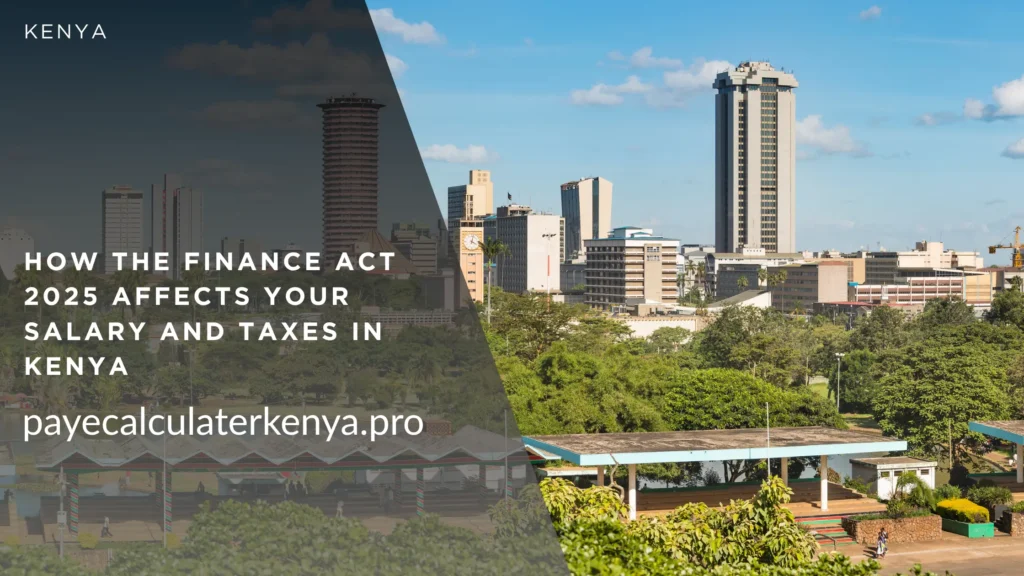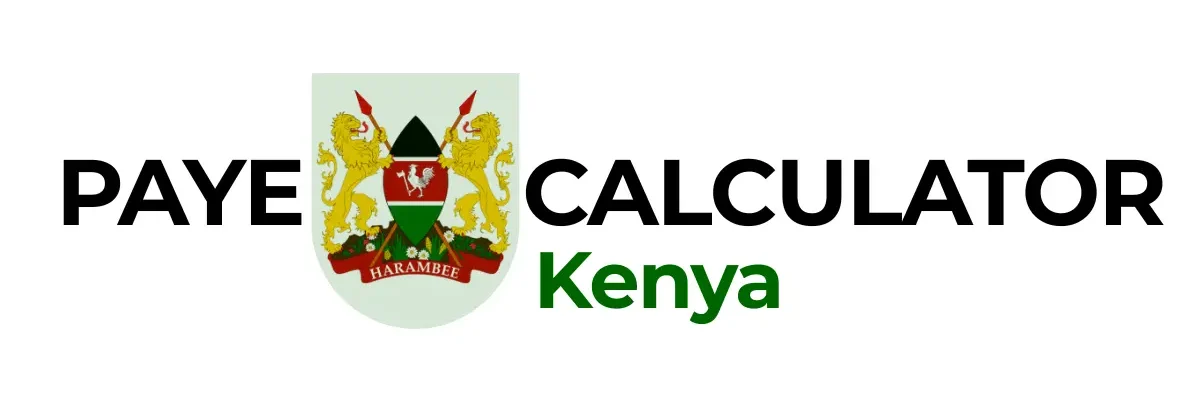How the Finance Act 2025 Affects Your Salary and Taxes in Kenya
The Finance Act 2025 brings new tax rules that could change how much money you take home from your salary in Kenya. These changes, effective from July 1, 2025, affect travel allowances, home loans, retirement benefits, job perks, and tax deductions. This article explains these updates in simple terms, so you can understand their impact on your finances. We use reliable sources like the Kenya Revenue Authority (KRA) and global tax experts to ensure accuracy.

1. Higher Tax Free Allowance for Work Travel
- What Changed: The tax free allowance for work related travel expenses, called per diem, has increased from KES 2,000 to KES 10,000 per day.
- What It Means: If your job involves travel, your employer can give you up to KES 10,000 daily without tax. This boosts your take-home pay for travel days.
- Example: Traveling for 5 days with a KES 10,000 daily allowance means KES 50,000 tax-free, saving you money compared to before.
- Who Benefits: Employees who travel often, like salespeople or field workers, will see more money in their pockets.
2. Tax Breaks for Home Construction Loans
- What Changed: You can now deduct interest paid on loans used to build your home, not just for buying or improving it.
- What It Means: This deduction lowers your taxable income, reducing your tax bill and leaving you with more money.
- Example: Paying KES 360,000 in interest on a home construction loan can be deducted, potentially saving thousands in taxes.
- Who Benefits: Kenyans building homes with loans from banks or approved lenders will pay less tax.
3. New Rules for Retirement Benefits
- What Changed: Some tax exemptions for retirement fund withdrawals have been removed, but gratuity payments are now tax free for both public and private schemes.
- What It Means: Withdrawing money from your retirement fund may now face taxes, reducing your retirement income. However, tax-free gratuity payments (lump sums at retirement or resignation) increase your net income.
- Example: A KES 1 million retirement withdrawal might now be taxed, but a KES 500,000 gratuity is tax free.
- Who Benefits: Retirees or employees leaving jobs with gratuity payments gain, while those withdrawing retirement funds may lose some income to taxes.
4. Taxes on Employer-Provided Benefits
- What Changed: Fringe benefits, like company cars or housing, are now taxed at a clear 30% rate.
- What It Means: The value of these benefits is added to your salary, and you pay 30% tax on them, reducing their net value.
- Example: A company car worth KES 500,000 per year adds KES 150,000 in taxes, lowering the benefit’s value to you.
- Who Benefits: Employees without fringe benefits avoid this tax, while those with perks may see a higher tax bill.
5. Ensuring All Tax Breaks Are Applied
- What Changed: Employers must apply all eligible deductions, reliefs, and exemptions before calculating Pay As You Earn (PAYE) tax, which is the tax deducted from your salary.
- What It Means: This ensures you get every tax break you’re entitled to, which could lower your tax and increase your take-home pay.
- Example: If you qualify for a housing relief, your employer must apply it, reducing your PAYE tax.
- Who Benefits: All salaried employees, especially those eligible for multiple deductions, will see more money in their paychecks.
How These Changes Impact You
The Finance Bill 2025 offers both opportunities and challenges. The higher per diem allowance and tax-free gratuity payments can increase your income, especially if you travel for work or are nearing retirement. Tax breaks for home construction loans help those building homes save on taxes. However, new taxes on retirement withdrawals and fringe benefits might reduce your net income if you rely on these. The rule ensuring all deductions are applied could boost your take-home pay by maximizing your tax savings.
| Change | Impact on Salary | Who Benefits Most |
|---|---|---|
| Higher Per Diem Allowance | More tax-free income for travel | Frequent travelers |
| Home Loan Interest Deduction | Lower taxable income | Home builders with loans |
| Retirement Benefits Taxation | Possible tax on withdrawals, tax-free gratuity | Retirees with gratuity |
| Fringe Benefits Tax | Higher tax on perks | Employees without perks |
| Mandatory Deductions | More take-home pay | Employees with multiple deductions |
What You Can Do
- Check with Your Employer: Ask how the per diem, fringe benefits, and deduction rules apply to your salary.
- Plan for Retirement: If you’re retiring soon, consult a tax expert to understand new taxes on withdrawals.
- Review Home Loans: If building a home, ensure your loan qualifies for the interest deduction.
- Stay Updated: Visit the KRA website (www.kra.go.ke) for the latest tax rules.
Conclusion
The Finance Act 2025 changes how your salary and taxes work in Kenya. Some rules, like higher travel allowances and tax-free gratuity, put more money in your pocket. Others, like taxes on retirement withdrawals and job perks, might increase your tax bill. By understanding these changes, you can make smart financial decisions. For personalized advice, talk to a tax professional.
References
- EY – Kenya Introduces Finance Bill 2025
- Cliffe Dekker Hofmeyr – Unpacking the Kenya Finance Bill 2025
- Kenya Revenue Authority (KRA)
Note: This information is based on sources available as of July 17, 2025, and is for general guidance. Consult a tax advisor for specific advice.
